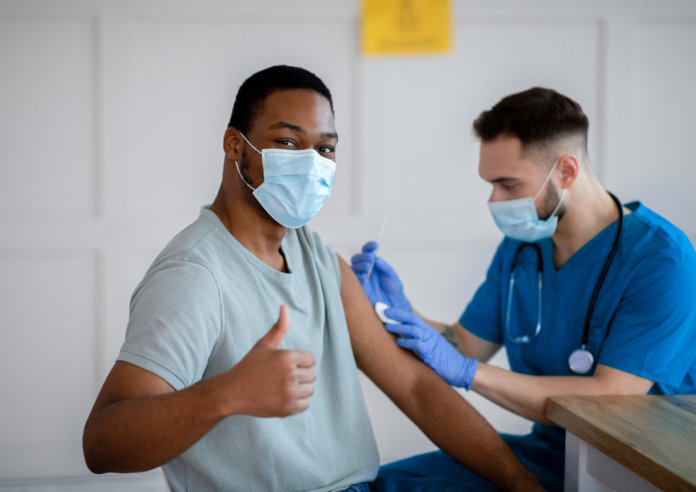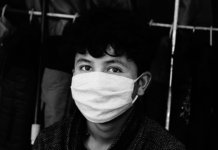By now, most of us are aware of COVID-19’s symptoms. And the Centers for Disease Control and Prevention (CDC) has said the vaccine may cause similar side effects as well. Possible vaccine side effects that you’ll feel throughout your body include:
- Fatigue.
- Headache.
- Muscle pain.
- Chills.
- Fever.
- Nausea.
Another common side effect of the vaccine is pain, redness and swelling where you get the shot.
According to the CDC, these side effects are nothing to worry about. If you feel them at all, they should last only a day or two before you’re back to your old self.
Though there aren’t sure steps given out by the CDC to prevent any of these side effects, there are things you can eat and drink before and after getting vaccinated to help lower the risk or better manage symptoms. Whether you’re getting the Pfizer, Moderna, or Johnson & Johnson shot, keep reading to find out what foods to avoid and what to include in your COVID-19 vaccine diet.
What to eat before getting the COVID-19 vaccine
The whole point of a vaccine is to stimulate your immune system and give it something to fight. Thus, you’ll want your immune system to be at its best. And that means taking care of yourself and making healthy choices. Adequeate rest, a healthy diet and hydration all play big roles in boosting your immune system.
Drink plenty of fluids
First, stay hydrated. Not only is drinking enough water essential for your health in general, but it will ensure you’re better suited to take on the vaccine.
Eat anti-inflammatory foods
Eat unprocessed foods that offer anti-inflammatory effects. Changing your diet the day before your appointment for the dose is unlikely to make a difference, but doctors and dieticians recommend following a healthy Mediterranean diet in the weeks before your appointment.
“A Mediterranean diet is a really good one to follow about two weeks before the vaccine, because it has an anti-inflammatory effect,” registered dietician Jessica Greene told WGCL-TV.
According to the Mayo Clinic, the main components of a Mediterranean diet include:
- Daily consumption of vegetables, fruits, whole grains and healthy fats.
- Weekly intake of fish, poultry, beans and eggs.
- Moderate portions of dairy products.
- Limited intake of red meat.
Don’t get vaccinated on an empty stomach
On the day of the vaccine, make sure to eat a meal before you get your dose. According to the CDC, they’ve received reports of people fainting after nearly all kinds of vaccines. Fainting is not a symptom of the vaccine, but instead happens because of the vaccination process. Anxiety and nervousness can cause this, and eating before can help prevent fainting.
What not to eat before getting the COVID-19 vaccine
Because hydration is so important, one thing to steer clear from the night before getting vaccinated is alcohol. Even a little bit of alcohol can cause dehydration, and that will only make possible side effects worse. Risking a hangover is counterintuitive to avoiding the side effects of the vaccine, since you probably won’t be able to tell the difference between them. Worst of all, alcohol may put stress your immune system, which defeats the purpose of vaccination.
You should also limit your intake of processed foods that cause inflammation in your body. These include:
- Sugar.
- Refined carbohydrates.
- Trans fats and vegetable oils.
- Processed meats.
Finally, avoid taking painkillers like aceteminophen (Tylenol) or ibuprofen (Advil) before your appointment. This is because painkillers may dampen your immune response and even suppress the production of antibodies. Producing antibodies to fight the COVID-19 virus and prevent infection is the whole point of vaccination.
What to eat after getting the COVID-19 vaccine
After getting vaccinating, you can use any of the “before” tips for your aftercare as well. Staying hydrated is key in ensuring you feel healthy after your dose. You should drink at least eight 8-ounce cups of water throughout the day.
In addition to not getting vaccinated on an empty stomach, you should also have a light snack immediately after the vaccine to further prevent fainting, according to the CDC.
What to eat if you experience side effects from the COVID-19 vaccine
If you do feel sick or lose your appetite, stick to classic cold and flu remedies like chicken noodle soup or veggie-based broth. These soups are light but still nourishing.
“Heart healthy fats, like fish or nuts or olive, these foods, can helps us, in general, feel better,” according to registered dietician Kristin Smith.
Go for easy-to-digest foods if you experience nausea. Good examples include:
- Bananas.
- Applesauce.
- Melon.
- Coconut water.
- Brown rice.
Be sure to stock up before your appointment on any food or fluids you think you’ll need. That way you won’t have to worry about going out to get them if you feel ill.
What not to eat if you experience side effects from the COVID-19 vaccine
Stay away from dairy products, fried food, sugary foods, meat and other heavy foods as they may make you feel worse.
Because soreness in the arm is common after injection, many people want to turn to ibuprofen or acetaminophen for relief. But remember that the side effects mean your immune system is doing it’s job. So it’s best to avoid these drugs if possible because they can interfere with your immune system’s healthy response to the vaccine. If you take painkillers normally to treat a medical condition, you shouldn’t stop taking them. But consult with your doctor.
If you experience soreness, the CDC suggests holding an ice pack or a clean wet warm cloth over the sore area.
Final thoughts
Before leaving the vaccination center, you will stay in the observation area for 15 minutes. While some get affected later, others have reported feeling some effects immediately. Remember, side effects are normal and shouldn’t last longer than 72 hours. If your side effects do not seem to be going away after a few days, be sure to call your doctor.




